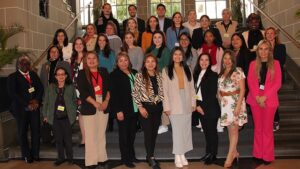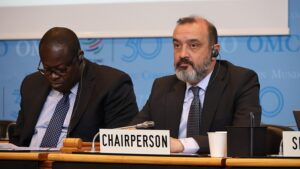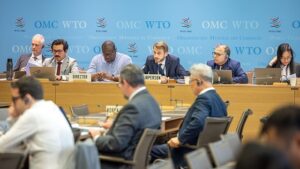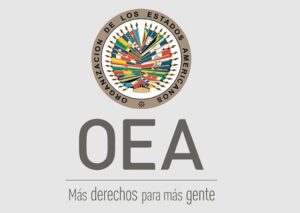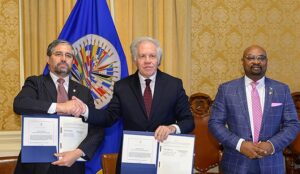Director General Azvêdo: el sistema de comercio basado en normas es “irremplazable” pero debe estar preparado para evolucionar
En un discurso que pronunció en el Peterson Institute en Washington D.C. el 11 de abril, el Director General Roberto Azevêdo subrayó la importancia crucial de la OMC para la estabilidad y previsibilidad del sistema mundial de comercio.
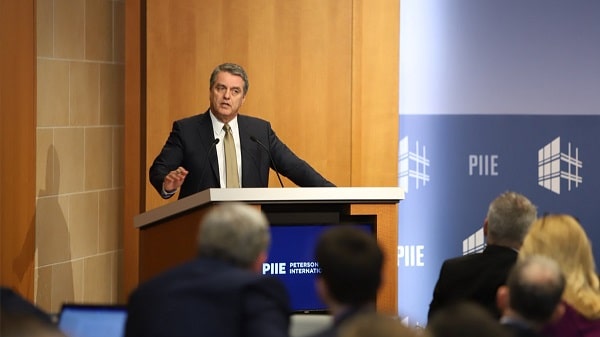
Remarks by DG Azevêdo
Introduction
Good afternoon everyone – and thank you to the Peterson Institute for the kind invitation. It is a pleasure to be here.
These are strange times in global trade.
Old certainties are being turned on their heads.
This was brought home to me last week when I saw pictures of campaigners in the UK holding up signs that read «I love the WTO.»
Of course, this is just a quirk of the Brexit debate, but for those of us that remember Seattle, it illustrates that we are in unfamiliar territory.
Trade policies are changing. Perspectives are changing. And the international trading system is changing as well.
I want to share some views on where this process of change might take us.
Let’s start by considering the state of trade and global economic cooperation today.
The state of play in global trade
Clearly tensions remain high – including between the US and some of its key trading partners.
Over the last year we have seen new tariffs put in place affecting a range of widely-traded goods.
Restrictive measures were imposed by WTO members last year on trade worth around 580 billion dollars. That is over seven times the level of the preceding year.
And it is hitting trade growth.
We published our outlook last week.
In 2017 trade growth stood at 4.6%. At that point we were optimistic that there was renewed dynamism and momentum in global trade. But that has not materialised.
Trade underperformed in 2018 with growth of 3%. The final quarter of 2018 saw the biggest drop in 10 years.
And we are forecasting a modest performance in 2019, with growth at just 2.6%.
These numbers should surprise no one. Trade simply cannot play its full role in driving GDP growth when levels of uncertainty are so high. Greater uncertainty means lower investment and consumption. Investment, in particular, has a more pronounced impact on trade, and this is reflected in these numbers.
There is potential for a slight improvement in 2020 – but that is at least in part dependent on an easing of trade tensions.
It is important to acknowledge that these tensions have not materialised out of thin air. They are fuelled by the genuine cares and concerns of citizens around the world.
Workers are being squeezed by the lingering after-effects of the 2008 crisis and the 4th industrial revolution which is transforming the labour market. Together these forces are fostering a heightened sense of fear and uncertainty about the future. This has helped to create an upsurge in anti- trade and, even more broadly, anti-foreign sentiment.
One important element here is the perception that trade is taking people’s jobs and sending them overseas. In reality the key driving force behind job losses is innovation and higher productivity enabled by technology – not trade.
But, regardless of the causes, it’s clear that people feel left behind by the pace of economic change. And this happens despite the fact that this modern economy is creating more jobs than it is destroying. So, the story is not about job losses, but about the lack of skills to fill the new positions.
This requires real action in domestic policy to help workers adapt. Governments are seeking to respond to this in their own way.
But no one is going to be helped by choking off trade.
Trade is part of the solution.
It has helped to build a more prosperous world and we must ensure that it continues to do so – in an ever more inclusive way. If the trading system needs to evolve to achieve this, then evolve it must. I’ll come back to this in a moment.
Clearly there are significant challenges to address. We need to set trade on a more positive path. And let’s be clear – there are some encouraging signs as well.
We are hearing positive reports of progress in discussions between the US and China.
Meanwhile there has been progress in numerous new agreements.
Of course, there is the USMCA which is currently in the process of ratification.
And there are a number of other major agreements which have recently come into force, or are set to do so soon – for example the CPTPP, the EU- Japan Economic Partnership Agreement, and the African Continental Free Trade Area.
In addition, there is a lot of activity at the WTO in various areas. We are trying to finalize – by December – an agreement to reduce subsidies that lead to overfishing. In January a group of over 70 WTO members committed to launch negotiations on e-commerce. And much more is happening in Geneva.
That brings me to the state of play at the WTO.
The state of play at the WTO
All of the challenges I’ve highlighted so far are reflected in Geneva.
Governments – including the US – are bringing their disputes and disagreements to the WTO. We are doing all we can through the system to help deal with members’ concerns and urgently reduce tensions.
Some see reforming the WTO itself as an important step towards resolving some of these issues; some of these trade tensions.
The G20 leaders issued a strong statement on this at their summit in December. The Leaders’ Declaration called for «necessary reforms» of the WTO, while also recognising the important contribution that the multilateral trading system makes. I have now attended six G20 summits as WTO Director-General, and let me tell you, this was a real shift in tone.
Out of a potential crisis, a once-in-a-generation opportunity to renew the trading system is beginning to emerge. This has to be a positive thing.
There is momentum behind these discussions. Some have concerns about the direction these conversations may take. But inaction would compromise the relevance or even the existence of the system as we know it.
So there is real energy for reform – but that gives rise to the more difficult question: what is reform? At present, nobody knows – there is no single answer to the question.
The debate on wto reform
From my conversations with members I think there are a few over-arching principles.
First, whatever the precise steps Members want to take, it is clear that the WTO has to be better, faster, and more responsive.
Second, no one is talking about tearing apart what we have. Rather, they are focused on taking necessary, practical, concrete steps that can have a rapid impact in driving our work forward.
Third, members are not talking about bundling things up into some kind of new package. Instead, we should harvest what we can when we can and move on.
So that’s the broad approach.
And in terms of substance, I think members’ conversations fall into 3 broad areas:
The first is how to strengthen the work of the WTO’s regular bodies and committees to improve areas such as notifications and transparency.
The second area members are looking at is how to improve the Dispute Settlement System and address the impasse in the appointments to the Appellate Body.
Our dispute work is a fundamental pillar of the organization and of the global economy.
It helps to depoliticize issues by focusing on the technical elements, and therefore helps to dissipate tensions. For that reason it is currently the busiest it has been for two decades.
Finding an urgent resolution in this area is absolutely critical for the system.
The third area members are considering is how to improve WTO negotiations so that we can keep delivering new agreements with real economic impact.
Negotiations were stalled for many years at the WTO.
We got the engine running again in 2013 and delivered a series of major agreements over the subsequent years, including the Trade Facilitation Agreement, the expanded Information Technology Agreement, and the elimination of agricultural export subsidies. Now we’re working to implement those deals.
We’re also continuing to work on longstanding issues where progress has proved more difficult – including agriculture, food security, domestic regulation in services, and development.
As I mentioned earlier, members are also negotiating an agreement on fisheries subsides. This is a hugely important piece of work – and we are doing everything we can to meet the end-of-2019 deadline.
Notwithstanding all this, I recognise the frustration that many have felt – and the need to speed things up. Multilateralism should not be synonymous with paralysis.
And this frustration is now translating into action. Members are engaging in different, more flexible and creative ways at the WTO.
This seems to be an obvious path for a system with 164 members of different sizes, different priorities and different stages of development.
At our Ministerial Conference in 2017, groups of WTO members announced what they call ‘joint initiatives’ to pursue discussions in a number of areas of emerging economic importance.
They include:
- electronic commerce,
- small and medium enterprises,
- facilitation of investments,
- and also the economic empowerment of women.
Not all WTO members are part of these initiatives. But they are open to anyone who wants to join. And the initiatives are gaining momentum.
Take the Joint Initiative on e-commerce which I mentioned earlier…
77 WTO members are now signed up, accounting for 90% of global trade.
The group includes the US, China, EU, and others from around the world – large and small, developed and developing.
Together they are setting the stage for the launching of negotiations on new e-commerce rules and disciplines under the WTO.
This is of real economic significance.
And it is of real systemic importance as well. Members are exploring innovative ways to deliver through the WTO. This is a quiet revolution in our working practices.
We need this process of strengthening and improving the WTO to work, because we need trade to work.
The rules-based system
Trade matters to us all. Indeed, I think the world needs contributions and analysis from institutions like the Peterson Institute to make this case and increase understanding. Your work is of tremendous value.
I know I don’t have to rehearse the benefits of trade here in this house. But allow me to give a quick summary…
- Trade helps consumers by lowering prices on the shelves. It brings greater choice and connects us with other cultures.
- It helps to create jobs – and these jobs tend to be better paid as well.
- It opens opportunities to sell goods and services abroad.
- It increases the supply of affordable and high-quality inputs to the domestic industry.
- It helps to underpin stronger, more stable and sustainable economic growth.
- Trade means that consumer expectations are globalised. They expect the best the world has to offer. And the same is true of business.
- Exposure to the latest technologies and to global competition is necessary for any truly efficient, competitive economy.
I want to be very clear about what I mean here.
When I say that «trade» brings these benefits, I am not talking about untrammelled free trade. And I will not be making the argument that free trade is a magic potion that, by itself, cures all economic afflictions.
But I do firmly believe in the need for rules-based trade.
If the WTO was a free trade agreement it would have been written on a single piece of paper instead of the many tens of thousands of pages that make up our rules and commitments.
And these are not rules given from on high. These are agreements and commitments that governments negotiate with each other and enter into freely, on the basis of shared interest.
Nations need a way of cooperating on trade issues and holding each other to agreed standards. And they need a forum in which to do so. That is what the WTO provides.
We can argue over the specifics and how things should change and improve – and we do.
But I think the need for this system is beyond reasonable doubt.
Consider a world without rules on trade – without the WTO…
- Tariffs could be raised without restraint and without warning.
- Outdated practices such as quotas and export subsidies could make a return.
- There would be no common disciplines on subsidies or services or intellectual property, and no forum to air grievances and resolve disputes.
- Businesses would have no certainty. Investment would decline, trade would decline, growth would decline, jobs would be lost.
- Minor technical conflicts could quickly escalate to become trade wars. And trade wars would threaten political stability.
To my knowledge no comprehensive work has ever been done to model a world without the rules-based trading system.
Our economists have assessed the impact of a full, global trade war. They have isolated the potential impact of tariffs being set unilaterally, instead of cooperatively in the WTO. This scenario would knock around 17% off global trade growth and cut global GDP growth by around 2%. This has the same order of magnitude as the damage caused by the 2008 financial crisis.
And yet this scenario is far less negative than a world without the WTO.
Conclusion
The WTO represents 70 years of accumulated effort, cooperation and trust.
It is irreplaceable.
But the WTO is not an end in itself. It only matters as a means to deliver growth, development, job creation and stability.
That’s where our focus should be.
A US business leader who is very supportive of the WTO told me recently that he finds himself spending too much time these days defending institutions.
I couldn’t agree more.
We need to get back to delivering new agreements which reflect the changing global economy, create new opportunities, and improve people’s lives.
That’s what the world needs to see from the WTO – and any reform that our members pursue should be judged on that basis.
Thank you.

